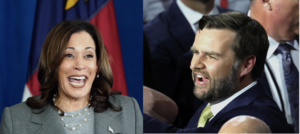The cultural kinship of JD and Kamala
Both candidates for U.S. vice president represent aggrieved groups whose overlapping concerns may point to a source of political unity.

Vice presidential candidates Kamala Harris and J.D. Vance
AP/Reuters
Long before he became the Republican vice presidential candidate, James David Vance was a critic of Donald Trump. A graduate of Yale Law School, he was also seen as part of the very elite he finds as a cause of America’s problems. To explain these apparent contradictions, the first-term Ohio senator, popularly known by his initials J.D., turns to an unlikely source.
He cites a quote from the late liberal U.S. Sen. Daniel Patrick Moynihan, who said, “The central conservative truth is that it is culture, not politics, that determines the success of a society.”
The “culture” that Mr. Vance seeks to represent is a segment of Americans who feel overlooked, undervalued, and deeply misunderstood. His selection as Mr. Trump’s running mate is an echo of the Democratic Party’s nomination of Kamala Harris for vice president four years ago. That moment also marked a cultural milestone, but one for women of color and an acknowledgment of the unique weight they have borne through American history with quiet dignity.
Mr. Vance grew up in poverty in Ohio and the Appalachian hills of Kentucky. His mother struggled with addiction. His grandmother, who helped raised him, did not graduate from high school. His formative years unfolded in the social and cultural decay of successive economic crises – the decline of steel industries and then of coal. He has a visceral empathy for the grievances that course through the political movement that Mr. Trump has given vent to.
“To me, the fundamental question of our domestic politics over the next generation is how to continue to protect our society’s less fortunate while simultaneously enabling advancement and mobility for everyone,” he wrote in his 2016 book, “Hillbilly Elegy.” “We can easily create a welfare state that accepts the fact of a permanent American underclass, one where family dysfunction, childhood trauma, cultural segregation, and hopelessness coexist with some basic measure of subsistence. Or we can do something considerably more difficult: reject the notion of a permanent American underclass.”
His main concern – and what ultimately aligned him with Mr. Trump – involves creating economic opportunity and upward mobility that enable American workers who feel forgotten to rediscover their worth and dignity.
“You have to be humble, and realize that politics are essentially a temporal game,” he said in a 2019 interview with The American Conservative about his Christian convictions. “I hope my faith makes me more compassionate and to identify with people who are struggling.” He seeks a politics sensitive to the “struggle to find stability in your own life, but also to become a good person when you didn’t have an easy upbringing.”
Early in the Trump administration, when cities were wrestling with whether to remove symbols of the Confederacy, then-Mayor of New Orleans Mitch Landrieu spoke of the need to ensure life, liberty, and the pursuit of happiness for all. “That is what really makes America great ... to hold fast to these values and together say a self-evident truth that out of many we are one,” he said.
Ms. Harris and Mr. Vance come from very different backgrounds and cultures. But acknowledging where there is overlap – in recognizing the crucial value and role of Americans who have often felt forgotten – may be a way for the politics of this presidential campaign to be different.

